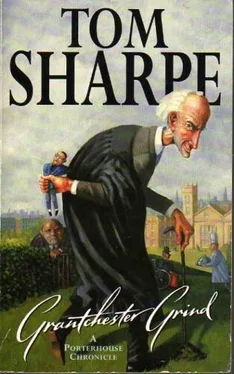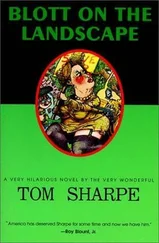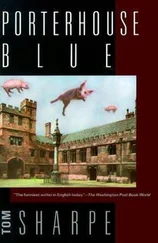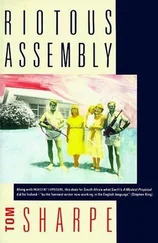'Reading that little lot I'd qualify the use of the word "happy". Still, you're probably right. She's old and there's no use larding the bacon. Sorry, I meant rubbing salt into the wound.'
In the secretary's office Mrs Ndhlovo was explaining to Vera why she was leaving Purefoy without telling him. 'I don't want to hurt him,' she said.
Vera said she understood but doubted Purefoy would be hurt for long. 'He falls in and out of love all the time. He was once passionately in love with me or thought he was. And my poor dear cousin is incapable of love or passion. He thinks all women are physical versions of words. It's the worst mistake possible. I doubt if he'll ever get married to anything more practical than a library. And at least you've got him off hanging. His mother will be ever so grateful. She had a bad enough time with his father who was always changing his mind. Purefoy's mind never changes. He clings to consistent falsities.'
At Porterhouse Park Skullion and the Praelector sat on the verandah together and stared out to sea across the mudflats and said-nothing. It was high summer and a few holidaymakers wandered the coast path in search of escape from the boredom of having nothing to do. The two old men knew better. There was no escape for them now. They had had the good fortune to have had something to do and, each in his own way, they had achieved something. The illusion sustained them now. There were no fishing boats out to sea and few fish left to catch. Only the little dinghies and yachts remained aimlessly trawling the wind for pleasure.
In the Master's Lodge the new Master was explaining to Arthur the right proportions needed for a really good Dog's Nose. It was not easy. Arthur refused to understand that a concoction made up of seven ounces of gin and thirteen ounces of beer could possibly add up to three thirds. As he told Cheffy, 'You'd think he had never been properly educated. Talk about vague.'
'Never known a don who wasn't,' said the Chef. 'Not in their natures.'
Out, on his rock garden the Dean decided to get rid of the gunnera next to the pond. It was gross and fleshy and coarsely out of place. Like so much he had come to detest, it came from the Americas. He would replace it with something small and simple and elegant and hardy. He was also thinking of the next Master. The Dog's Nose man couldn't last long. He was drinking himself to death. It was the Dean's one consolation.
His thoughts, inspired by the coming fate of the gunnera and the loathsome Pimpole, turned towards the Japanese. What that infernal man Lapschott had said was true. The Japanese were an island people, were in fact what the British had been, at once hardworking and violent and ruthlessly efficient. They were inventive, and their engineering was superb. They learnt from their mistakes, and they persevered. They were immensely rich, they believed in discipline and the need for authority, and they understood the vital importance of ritual and ceremony in preserving the decencies of life. Above all, they had the virtues of courtesy and courage. They did their duty to the death. For the first time in his life the Dean looked without shrinking into the face of the inconceivable and was undismayed. He would work for the appointment of a Japanese Master of Porterhouse. And for him.
It would be an honour.

Tom Sharpe was born in 1928 and educated at Lancing College and Pembroke College, Cambridge. He did his National Service in the Marines before going to South Africa in 1951, where he did social work before teaching in Natal. He had a photographic studio in Pietermaritzburg from 1957 until 1961, when he was deported… From 1963 to 1972 he was a lecturer in History at the Cambridge College of Arts and Technology. In 1986 he was awarded the XXXIIIeme Grand Prix de l'Humour Noir Xavier Forneret. He is married and lives in Cambridge.
***















